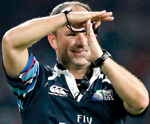The Joubert predicament
View(s):The Rugby World Cup 2015 is in the semi-final stage. The pressure has built on players while the heat is on match officials and much will be talked about the exit of Scotland. The anticlimax of the quarters was the humiliating defeat of France at the hands of New Zealand. The score of 62-13 was not what expected at this stage of the world cup. Yet the shocker as most claims is the last minute penalty for Australia which laid to rest the progress of Scotland to the semi-final.
 The World Rugby chief executive, Brett Gosper, defended Joubert, and went onto say “there are highly paid professional rugby players out there making mistakes and dropping balls but of course they don’t get as vilified as match officials do, It’s a very, very tough job and I don’t think there’s a tougher job. “It will all be talked through and what I would say is the standard of refereeing in this tournament overall has been exceptionally high. Joubert’s one of our finest referees, is a good man. Mistakes can happen. There’s a human element still.”
The World Rugby chief executive, Brett Gosper, defended Joubert, and went onto say “there are highly paid professional rugby players out there making mistakes and dropping balls but of course they don’t get as vilified as match officials do, It’s a very, very tough job and I don’t think there’s a tougher job. “It will all be talked through and what I would say is the standard of refereeing in this tournament overall has been exceptionally high. Joubert’s one of our finest referees, is a good man. Mistakes can happen. There’s a human element still.”
“It is interesting that at the beginning of the tournament everyone thought there was too much TMO and suddenly at the end there is not enough. If we TMO’d every decision a ref made we would be here all night. You do have to draw the line, the balance has to be found between the critical TMO calls and the ones that are in the referee’s domain.”
Can you pinpoint that one incident in the last minute as the cause to Scotland to exit? The decision if the ball was handled by the Scot was from an offside position it is clearly a penalty under law 11.7. The question then stands on interpretation to decide whether it was intentional or accidental. The referee in that moment thought it was a penalty offense and acted on what he saw. This was not something he could have referred to the TMO as it was not in the protocol. The TMO can only be used in the following circumstances: Determining the grounding of the ball in-goal for a try or touchdown and/or whether players were in touch or touch in goal before grounding. Determining whether a kick at goal has been successful. Confirm if an infringement has occurred in the build-up to a try or prevention of a try (infringement must be within two phases of the try or touchdown). Considering acts of possible foul play.
 The pressure on this occasion was on the referee who would have been pinned whatever decision he made. The next issue was whether the Australian Phipps played previously in which case there cannot be an offside. World rugby has clarified in its statement that the Australian played the ball following the knock on and the decision should have been a scrum for Australia. To be a referee is not an easy job as people who referee from the stands think. Many would talk but will never walk the talk.
The pressure on this occasion was on the referee who would have been pinned whatever decision he made. The next issue was whether the Australian Phipps played previously in which case there cannot be an offside. World rugby has clarified in its statement that the Australian played the ball following the knock on and the decision should have been a scrum for Australia. To be a referee is not an easy job as people who referee from the stands think. Many would talk but will never walk the talk.
efereeing involves making game-changing, possibly life-changing decisions, under huge pressure and in this case about 80,000 people .On a good day you go unnoticed. Nobody on the bar stand will recognize you. Then if you make a mistake everybody talks as though nothing else happened in the match. If we take these 80 minutes incidents at all points of the game had a bearing. To Australia it was more frustrating as they thought that the Scots were easy meat. To Scotland who gave it all the annoyance is the last minute penalty that cost the semifinal berth. Can there be any explanation as to why Scotland did not go secure ball at front of line out? Ask why the throw was bad and the jumpers failed to catch it. What about the conversion that was missed by the reliable Laid law. Every one of these incidents had an impact on the game while the scores got much close as Australia was denied a try on TMO intervention.
The lesson to be learnt by the local rugby fraternity is that even at the top level a mistake can happen. If you see it on real time the knock on and the ball hitting the Aussie a being picked up is virtually a split second. The referee saw it on real time and not at a slow motion review and he did not have the law with him to refer to the TMO. We talk of this so much probably because Joubert ran off the field. Yet nobody talks whether the South African front row stood up just before the try that beat Wales. Wales won this game almost in the final minutes. The game will go on as we talk about the match that was lost more than won.
* Vimal Perera is a former player, coach, referee and an IRB Accredited Referees’ Educator


